Choosing a water heater system can seem daunting, but we have put together all the facts about electric and gas water heaters for your convenience.
After reading this you’ll have an easier time making a choice, and we assure you that your questions or uncertainties about water heaters will be addressed.
Let’s start with the pros and the cons.
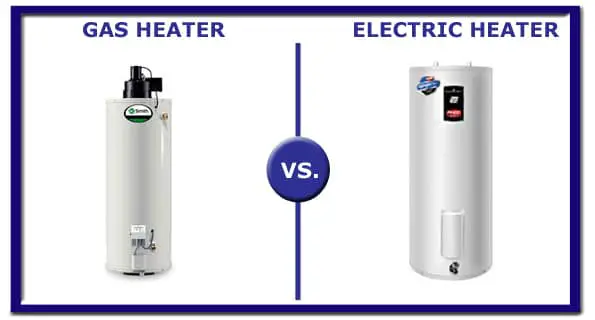
TL;DR: Gas vs Electric Water Heater
Before we break into the detailed comparison, here is a quick overview.

Gas Water Heater
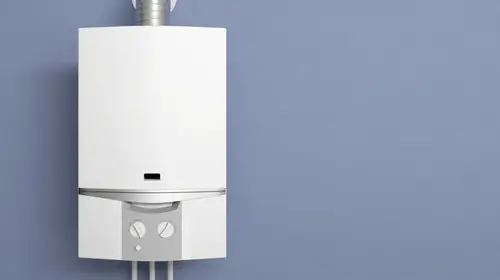
Electric Water Heater
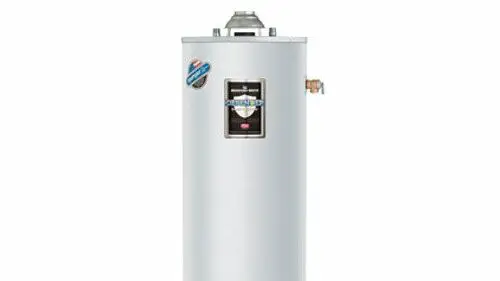
Pros
Gas Water Heater
Heats the water faster
Available in a range of sizes
Lower monthly energy costs
Operational during a power outage
High energy-efficiency models available
Electric Water Heater
Less energy loss
Less maintenance
No safety concerns
Lower upfront costs
Available in a range of sizes
Cons
Gas Water Heater
Safety concerns
More energy loss
More maintenance
Higher upfront costs
Electric Water Heater
Higher monthly costs
No high-efficiency models available
It does not heat the water as quickly
Will not operate during a power outage
Best For
Gas Water Heater
People on the go who need instant hot water and want to save money in the long run.
Electric Water Heater
Large households with ample installation space and who are willing to pay the energy costs.
What is a Gas Water Heater, and How Does it Work?
A gas heater is a water heating system that runs on natural gas or propane. There is no reservoir in a gas heater to store hot water. Instead, it heats the water instantly. Activation will only take place when there is a demand.
For example, if someone opens up the hot faucet, the gas heater will activate and send hot water to the faucet. When the tap is closed, the gas heater will deactivate and stop producing hot water.
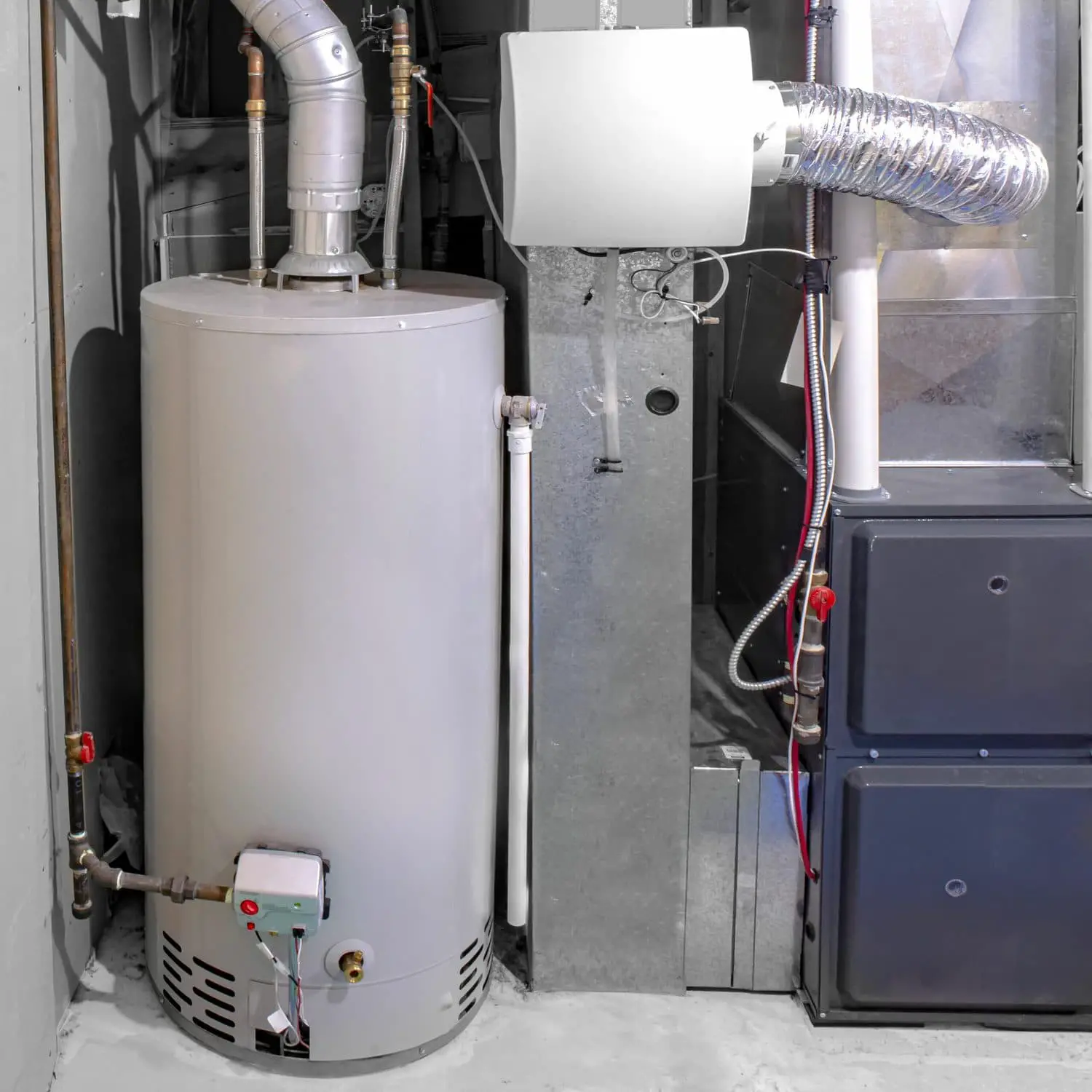
Once the hot faucet is opened, the gas heater will detect water flowing through the heater. Ignition will now take place. A small amount of gas will flow into the combustion chamber. It will ignite the gas with a continuous pulsating electric spark.
Then the gas is lit, and the pulsating electric spark will continue. Now the heater knows there is ignition, allowing gas to flow to the rest of the burners. The gas will ignite on the rest of the burners, and the heat produced will pass through the heat exchanger.
Water passing through the heat exchanger will get heated by the hot combustion gasses and flow through your faucet. Closing the faucet, the heater will detect that the flow stopped and will deactivate.
What is an Electric Water Heater, and How Does it Work?
An electric water heater is a large insulated storage tank that holds hot water until it’s needed. Tank-type water heaters come in various sizes, but a 40-or 50-gallon tank will be perfect for most households. Cold water enters the bottom of the tank and is heated by electric elements suspended inside the tank. The water temperature is regulated and maintained by an adjustable thermostat. Excessive buildup of pressure inside the tank is prevented by a pressure-relief valve.
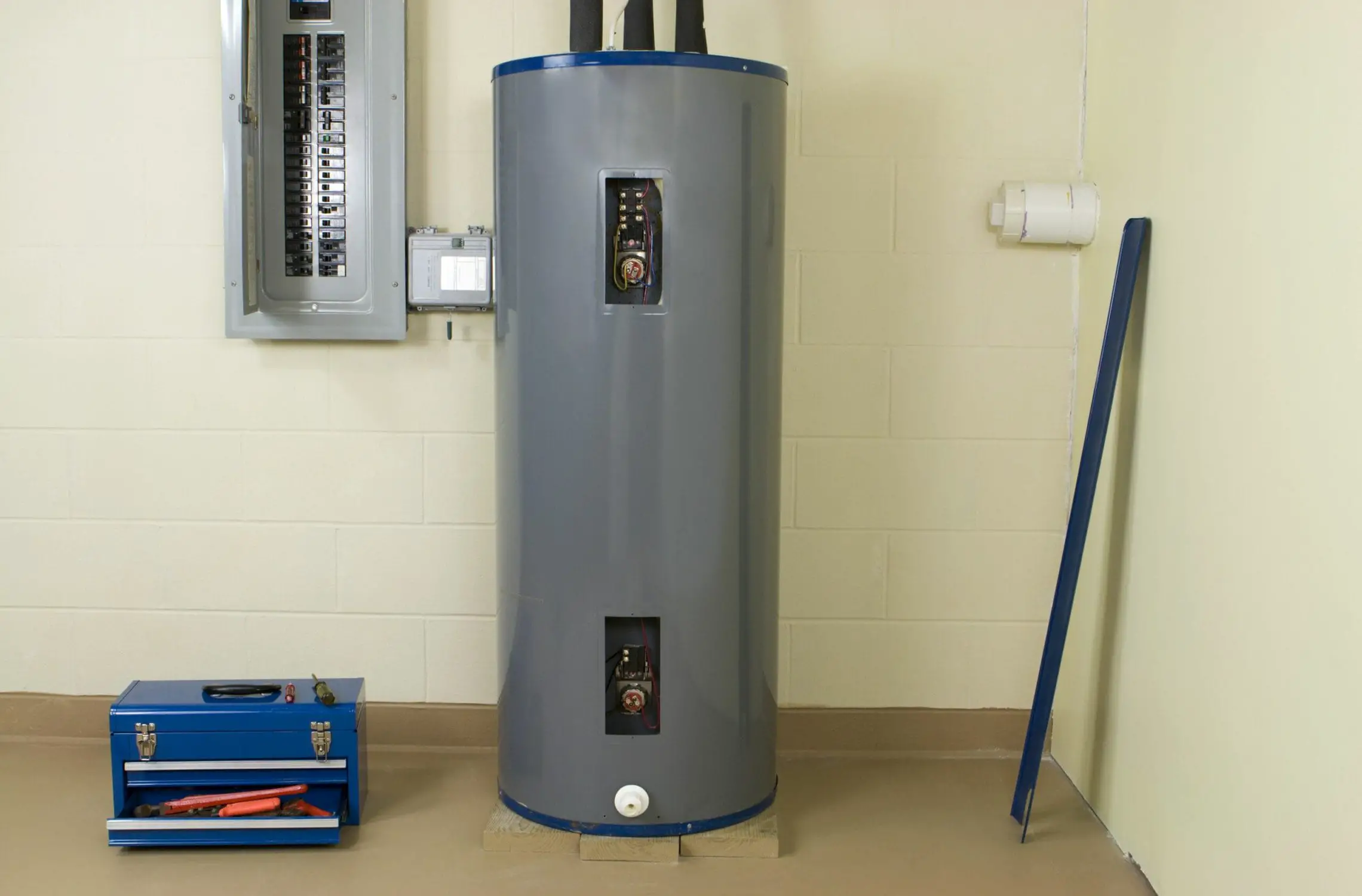
When hot water is called for at a faucet or appliance, heated water is pumped out the tank’s top and through the home’s hot-water supply pipes. Coldwater automatically refills the tank as the water level drops.
Relevant Characteristics Between Gas and Electric Water Heaters
Here’s a quick look at the specifications of both versions.
Gas Water Heater vs. Electric Water Heater
Compare by tapping or clicking below!

Cost
Gas Water Heater
$400 to $800, and $1,000 to $2,000 for installation
Electric Water Heater
$300 to $700, add $700 to $1,000 for installation
Efficiency
Gas Water Heater
Most gas-fired water heaters have an energy factor (EF) number, set by the USA. The standard gas water heaters have an EF of about .50 -.60
Electric Water Heater
The energy factor is 0.90 (depending on tank volume), and the best available is 0.95 EF
Maintenance Requirement
Gas Water Heater
- Easy to maintain
- Flush regularly
- Some gas tanks may need the vent cleaned on occasion, as particulates from the gas build up inside
- All gas lines should be inspected periodically to prevent gas leaks
Electric Water Heater
- Easy to maintain
- Flush regularly
- Replace the anode rod
- Insulate the water pipes if needed
- Test the TPR valve
- Adjust the temperature
- Insulate the heater if needed
First-Hour Rating (FHR)
Gas Water Heater
- 40 (gallons) x .7 (70 percent of the tank capacity)
- + 22.5 (GPH at 80-degree rise in temp)
- = 50.5 gallons first-hour rating
Electric Water Heater
- 40 (gallons) x .7 (70 percent of the tank capacity)
- + 22.5 (GPH at 80-degree rise in temp)
- = 50.5 gallons first hour rating
Energy Factor (EF)
Gas Water Heater
Between 0.5 and 0.7
Electric Water Heater
Between 0.96 to 0.99
Longevity
Gas Water Heater
8-12 years
Electric Water Heater
10-15 years
Similarities and Differences
To make your choice between a gas and electric water heater simpler, we will now break all the similarities and differences down for you.
Differences Between Gas and Electric Water Heaters
To start with, we’ll analyze the significant differences between these two heater types. You’ll be able to see how much they vary.
Appearance
The difference between an electric and gas water heater is firstly recognizable in the look of the system. Your gas water heater does not come with a tank that can take up considerable space in your home.
Cost
The factor that most people are more interested in is the cost. A gas water heater will be more expensive to initially purchase and install. But you will save money in the long run as natural gas and propane are much more cost-efficient than electricity.
Maintenance
When it comes to maintenance, the gas heater differs quite a lot from its electrical counterpart. Firstly because gas is used in one, there is always a chance of a gas leak, so all gas lines should be checked regularly. The other mechanism absent from an electric heater is the vent in a gas heater. This should also be cleaned periodically, as debris can accumulate on the vent and prevent the heater from working in an optimal fashion.
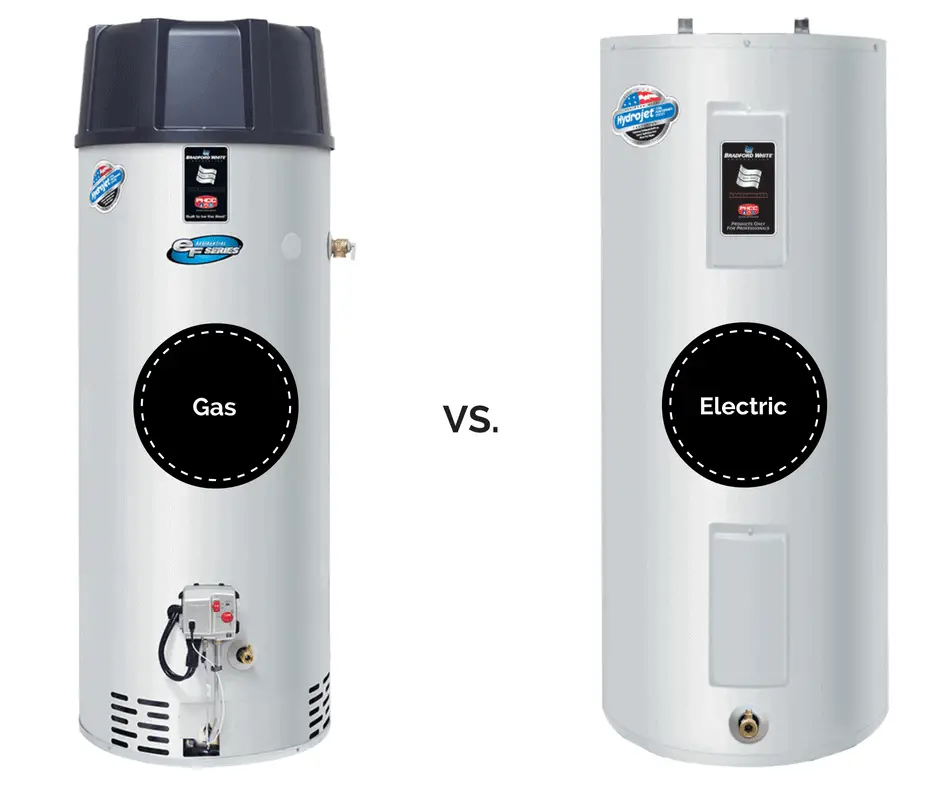
An electric water heater with a TPR valve that can be worn down has to be replaced every few years to let pressure work correctly. The anode rod might also need replacement as it starts to erode after a while. This rod is essential as it keeps the tank from getting any rust on the inside. If you are in a colder region, it is also advised to insulate your water pipes and the tank itself.
Durability
An electric water heater usually lasts longer than a gas water heater, but that entirely depends on if the maintenance is done regularly and correctly.
Energy Factor
There is a vast difference in the Energy Factor between a gas and electric water heater. The latter has Energy Factors that range from 0.96 to 0.99.
Similarities Between Gas and Electric Water Heaters
There aren’t many similarities between them. They are both straightforward to maintain, and both of them should be flushed regularly. The first-hour rating is also the same for the two.
Advantages of a Gas Water Heater
When using a gas water heater, a gas furnace is fueled by propane or natural gas. A dip tube supplies cold water to the bottom of the tank. The heated water then flows from the top of the tank via a delivery pipe. All of this happens when a hot faucet is turned on.
Water is kept warm continuously between heating cycles as every unit is equipped with insulation. And as a safety feature, all water heaters have a temperature-and-pressure relief valve, which opens if either the water temperature or pressure exceeds a safe limit.
Top Advantages
You can get different gas heating systems like a standard storage tank, high-efficiency storage tank models, and tankless water heaters. It doesn’t matter what type of heater you choose, and they offer the following advantages compared to electric heaters.
- It has double the speed of electric water heaters, and a faster recovery rate, too. This means your hot water supply is quickly replenished. A gas heater is a better option if you have a large household or a high demand for warm water.
- Gas heaters are more affordable to operate because natural gas and propane are significantly cheaper than electricity.
A gas heater saves you money in the long run. If you consider a gas heater’s operating costs, it doesn’t matter that it is more costly to buy initially as you will make up the difference in the price in about a year.
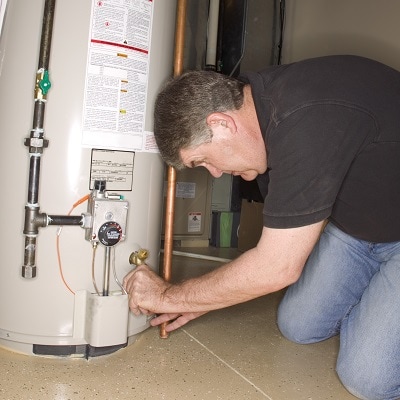
Easy Installation
Gas water heaters are very easy to install, especially if you already have a gas line in your home.
Cleaner Water
Tankless gas water heaters boil and heat freshly piped water. A standard water heater heats water stored in a tank, which can rust and collect hard mineral deposits. Unfortunately, the quality of the water declines as the tank gets older.
We all know that tankless water heaters consume more energy than storage water heaters which use energy slower. If you keep your maintenance upon your standard water heaters, you will always have little to no water quality issues.
Everybody appreciates clean water whether we drink it or use it in day-to-day life. Knowing your tap water is of high quality, your mind can be at ease.
Even here, there are no significant headaches as the installation process is straightforward, and a professional can install your gas heater with ease in one day. Also, when the cost of living is getting harder to maintain, a gas water heater’s cost-effectiveness can not be matched.
Yes, initially, buying the whole system might cost a pretty penny, but you save a tremendous amount of money in the long run.
Advantages of an Electric Water Heater
There are many reasons households should instead consider installing electric water heaters. Listed below are some of the most significant advantages that electric water heaters have against the competition.
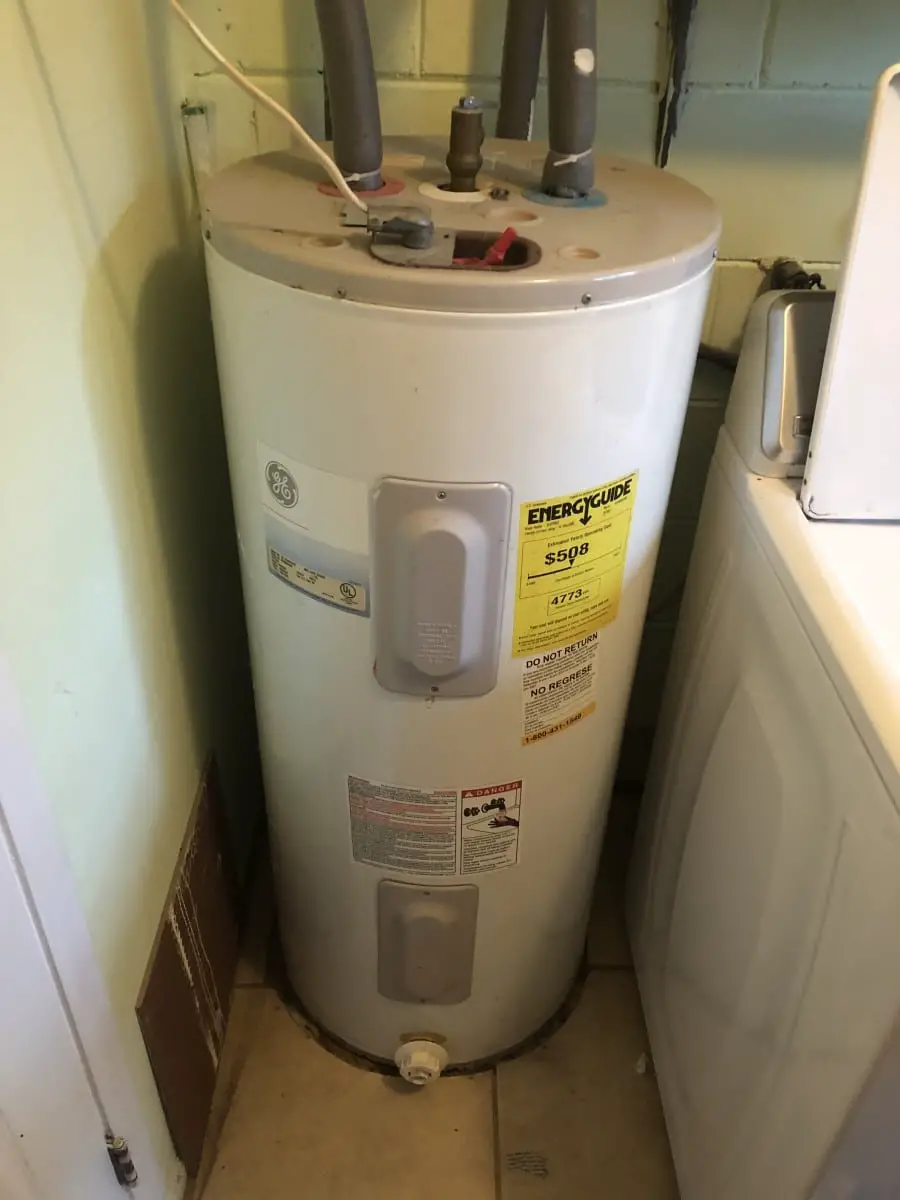
Lower Costs
The upfront price of an electric water heater will be your most affordable choice. Regardless of the fuel used to power your water heater, the size and type will determine your water heater’s ultimate cost.
Electric water heaters do not need additional piping or a ventilation system like a gas water heater. Saving money on this part helps a lot, but you will always need to keep maintenance up on your heater; no matter what type you have, an electric water heater will require a new rod or valve every three to five years.
Efficiency will be determined by the respective energy factors (EF). Electric water heaters win in the efficiency perspective.
No Gas Leaks or Risks of Explosions
The most significant trouble with your electric water heater is that it might spring a leak, or the element might burn out. But ultimately, no considerable hazardous or fatal risks can be expected from your water heater.
Availability of Electricity is Constant
That being said, the electrical grid might go off from time to time. As long as you have electricity, you will have warm water.
Efficiency and Safety
Everybody wants to save money where they can, and as a homeowner, you do not want to be caught out in the cold with no hot water and high costs to deliver it. Gas water heaters, unfortunately, are not as efficient as electric water heaters. Especially when it comes to safety, we have all heard the horror stories of gas leaks and even explosions that injured and even killed homeowners.
These unfortunate instances can be pushed out of your mind, as with an electrical water heater, these fears are limited to a water leak or a burned-out element that can be replaced. All in all, if maintenance is kept up on the water heater, you have no problems.
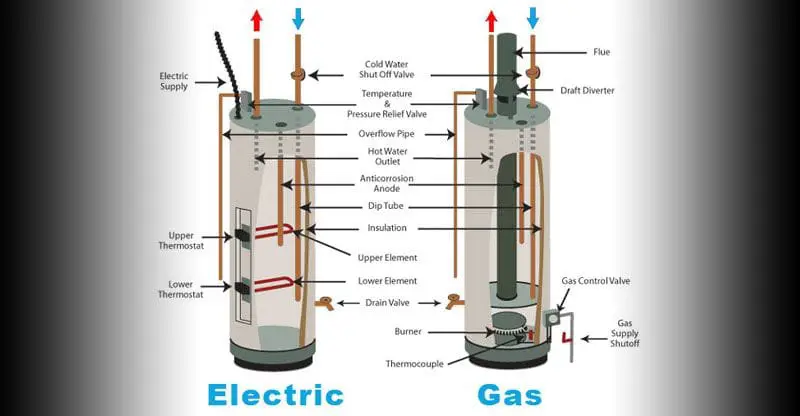
Factors to Consider Before Choosing a Water Heater
Before you decide on a water heater, there are some aspects you need to consider. We’ll highlight to most significant ones below.
Quality of the Tank and Heating Element
If hard water is what you receive, special attention must be paid to the tank and the heating element material. Because hard water has a high content of calcium and magnesium, it can cause build-up or scaling. This would lead to a shorter life span of the heater, decreased efficiency, and corrosion. Look for corrosion-resistant water heaters for a long-lasting home appliance.
Safety Features
One must always be aware of the risks and safety features of a storage water heater. Make sure to check for the safety valve. This device opens to relieve pressure if the pressure or the temperature gets too high, preventing explosions.
Energy Consumption
The electricity consumption of water heaters depends on multiple factors.
- Volume of water used.
- Standing loss –It is the heat lost through the water heater’s surface due to non-usage of already heated water.
- Input water’s temperature – Homes located in colder places would require more heating than those in a warmer climate.
- User’s preference of temperature – The thermostat temperature is set chiefly to about 140° Fahrenheit for most water heaters.
What About a Tankless Water Heater?
Have you considered choosing a tankless water heater? Let us show you how they work and the top pros and cons.
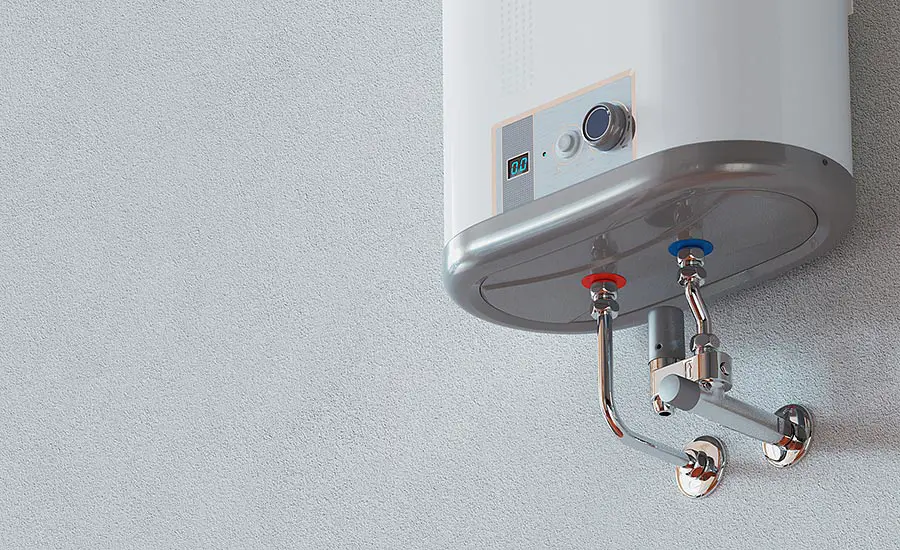
How it Works
A storage tank is absent in a tankless water heater, as the name implies. Therefore they heat water directly. When you open a hot water faucet, cold water flows into the unit via a pipe. The water will be heated either by an electric element or a gas burner.
There is no wait for hot water to fill up a storage tank. You will have a constant stream of hot water. But unfortunately, a tankless water heater’s output limits the flow rate.
A tankless water heater provides two to five gallons of water per minute. Higher flow rates are produced by gas-fired tankless water heaters than electric ones. For simultaneous or multiple uses in large households, the largest gas-fired model cannot continually supply enough hot water. However, two or more tankless water heaters, connected in parallel, can be installed to overcome this problem.
Advantages and Disadvantages
Demand water heaters can be more energy-efficient than conventional storage-tank water heaters for homes that use 41 gallons or less of hot water daily. They can even be more energy efficient for homes that use around 86 gallons per day.
You can achieve even more significant energy savings if you install a demand water heater at each hot water outlet.
The expensive choice in water heaters is a tankless one, but it will also last much longer than the cheaper conventional ones. The operational and energy costs are also lower. Twenty years is the maximum that most tankless water heaters can last.
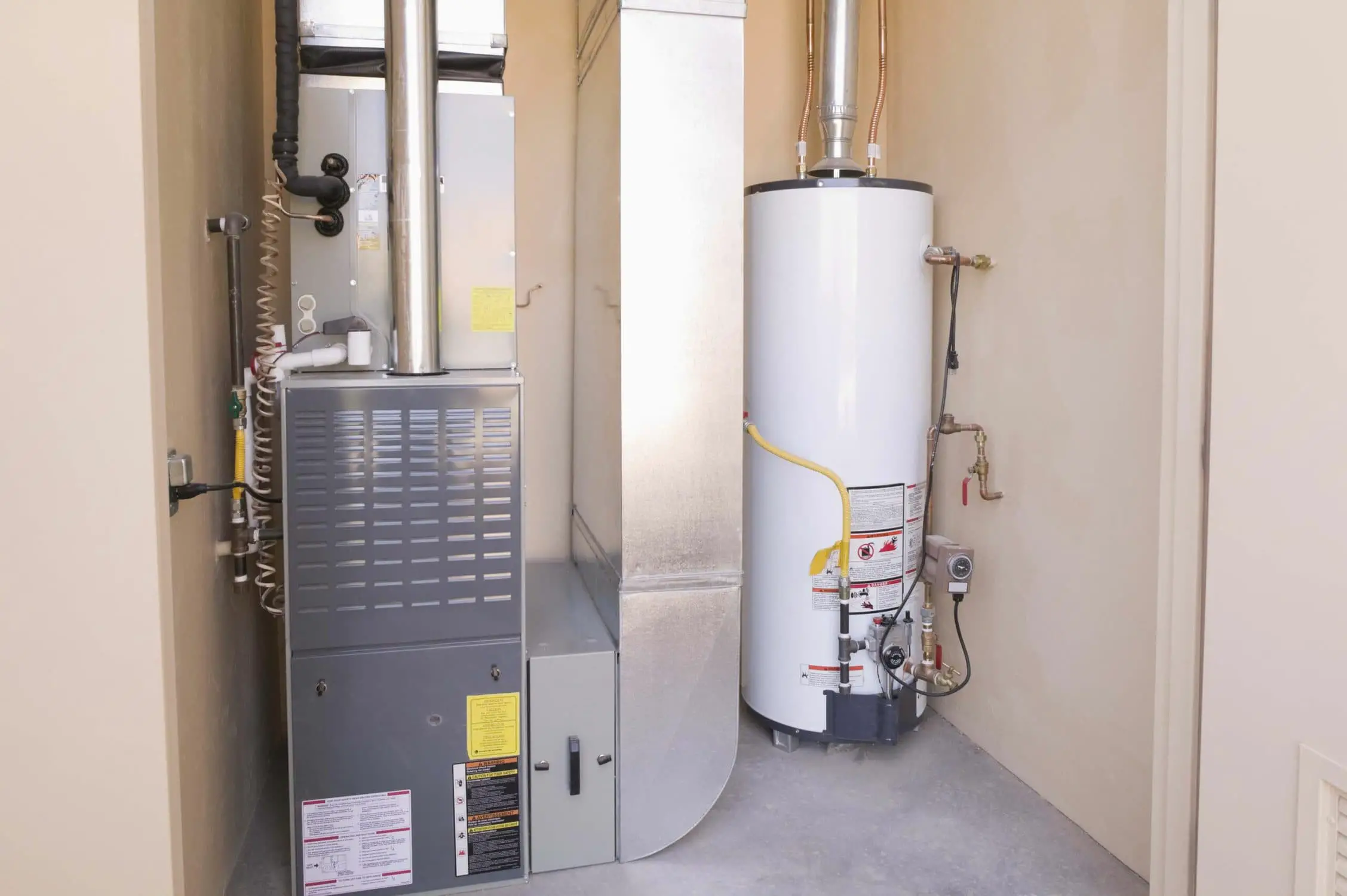
Storage water heaters can last up to 10-15 years if proper maintenance is done as the parts are easily replaceable.
Standby heat losses can be avoided by tankless water heaters. Gas-fired tankless water heaters have a higher flow rate than electric ones, and a wastage of energy occurs if the pilot light is constantly burning.
And this takes care of standby energy losses when compared to a storage water heater. The water in the tank of a gas-fired storage water heater heats the water in the tank by a pilot light, so the energy isn’t wasted.
Environmental Concerns for Water Heaters
Unfortunately, some water heaters have a negative effect on the environment. Here are some elements for your to assess before buying one.
Conventional Electric Water Heater
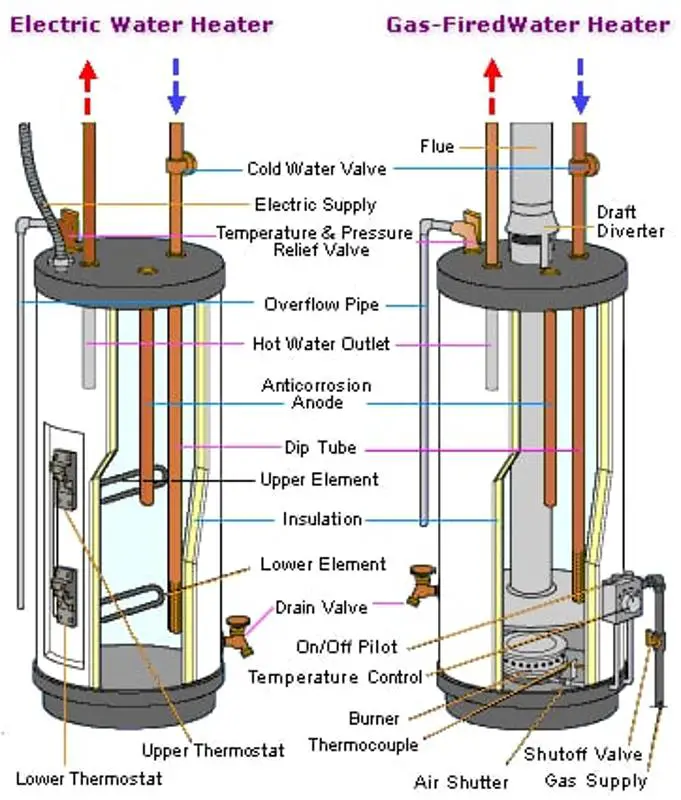
Energy consumption in your standard electric heater is very harmful to the environment, and you might not be aware of it. In the eco-friendly list, your conventional electric water heater is at the bottom end, unfortunately.
Green energy is one of the best ways to reduce harmful greenhouse emissions into the environment; many parts of the United States use green energy. Unfortunately, traditional power plants are using fossil fuels, which are not green energy, to create electricity.
When you are not using green energy, the electricity plants generating the power for your hot water use a large amount of fossil fuel.
Conventional Gas-Powered Water Heater
A gas heater still produces many harmful emissions, although a gas-powered water heater is slightly better for the environment than an electric water heater. And it produces fewer emissions than the power plant in providing electricity to an electric water heater.
A water heater that is not in excellent working condition can produce more carbon emissions while working harder to keep up with your hot water needs. The best water heater is a well-maintained water heater.
Water Heater Laws
Water heater manufacturers were required to comply with new Department of Energy (DOE) efficiency standards as of April 16, 2015, so that new technologies have to be used to gain efficiency.
With the new 2015 standards, Energy Factor (EF) and tested using Appendix E to Subpart B of 10 CFR 430 are being used in the rating of residential water heaters. Using 10 CFR 431.106 (Subpart G of 10 CFR 431), commercial water heaters are rated with Thermal Efficiency (TF) and Standby Loss.
The American Energy Manufacturing and Technical Corrections Act (AEMTCA) enacted a uniform efficiency descriptor (UED) and test methods for residential and commercial water heaters on December 18, 2012. It also allowed DOE to exclude certain water heaters from UED if they were effectively rated using existing metrics and did not have a residential use.
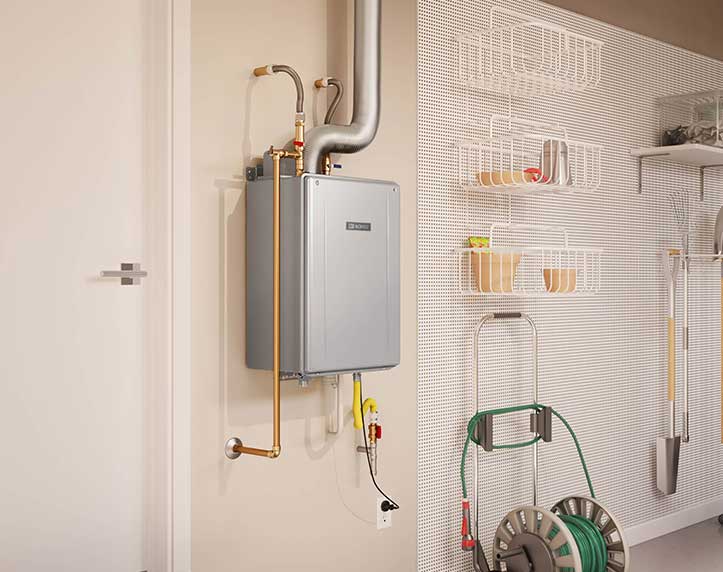
Determination of the Energy Factor was simulated using a test that measured the heat out and the energy input over 24 hours. The test was conducted by imposing six ample hot water draws on the water heater at one-hour intervals at the beginning of 24 hours, and the total hot water load was 64.2 gallons/day.
Detection of a few shortcomings in the test, like the water use profile with six large draws, was not representative of actual use conditions; the hot water load of 64.2 gallons/day was not expected of typical water use in your regular home; the range of products covered by the DOE standard excluded some of the recently developed water heaters.
The DOE published a test procedure final rule in the Federal Register (79 FR 40541) on July 11, 2014, establishing the Uniform Energy Factor metric.
Bottom Line
Every household is different, and if you still can’t decide what sort of water heater will fit yours let’s give the facts straight to help you in your decision. Gas water heaters are more expensive to go and purchase. Still, you will save money in the long run, saving money on energy costs, you will have hot water in a power outage, hot water will be available on-demand, and installation is easy. With an electric water heater, you have less energy loss, lower upfront costs when buying a tank, less maintenance, and most importantly no safety concerns.
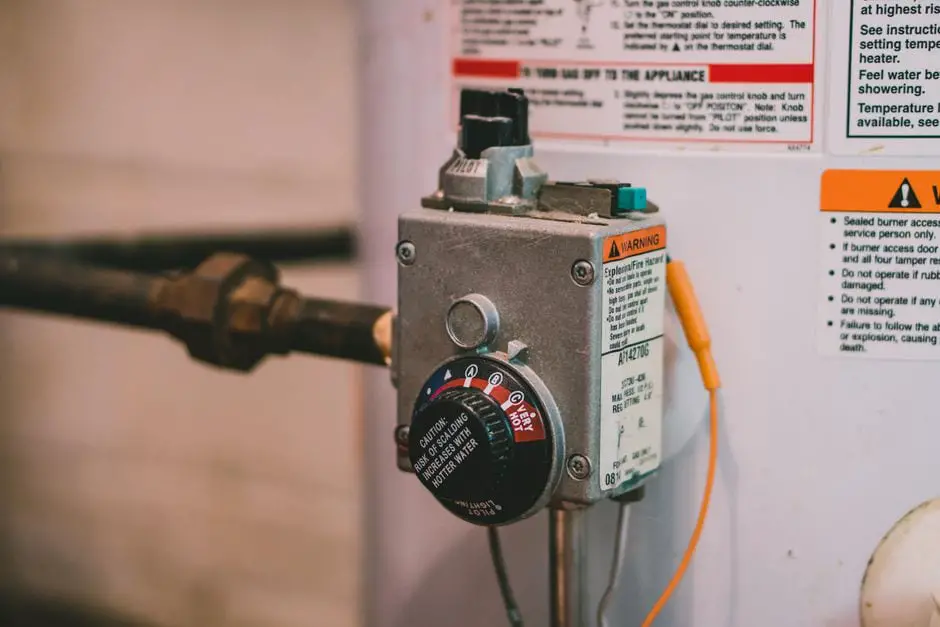
People Also Ask
Here are some questions surrounding the topic.
In case we have left you with any burning questions, here are a few FAQs from our readers. Please feel free to send us any other queries you may have.
Most homeowners assume that their gas water heaters will work in a power outage, and that is a reasonable assumption as gas water heaters don’t use electricity as fuel. Your gas water heater will continue to work normally in the event of a power outage only if a continuous gas pilot light is being used.
If it’s your own home, many building jurisdictions will allow you to do the modifications yourself, but a licensed electrician might be required in a few jurisdictions to do the work. Just make sure you follow all safety regulations before you start installations.
Gas water heaters are usually cheaper to operate than electric, but it depends on your local utility costs. Gas water heaters also cost more upfront than an electric option. But you make up the difference in price in about a year based on energy savings.
The costs range: $300 to $600 for gas; $250 to $500 for electric.
Yes, they are. No carbon monoxide is produced, and no combustion or explosions are a threat. Electric water heaters don’t lose energy from the exhaust or the replacement air circulating into and out of a house. As no vent or gas line is needed, an electric water heater’s cost is less to be installed.
